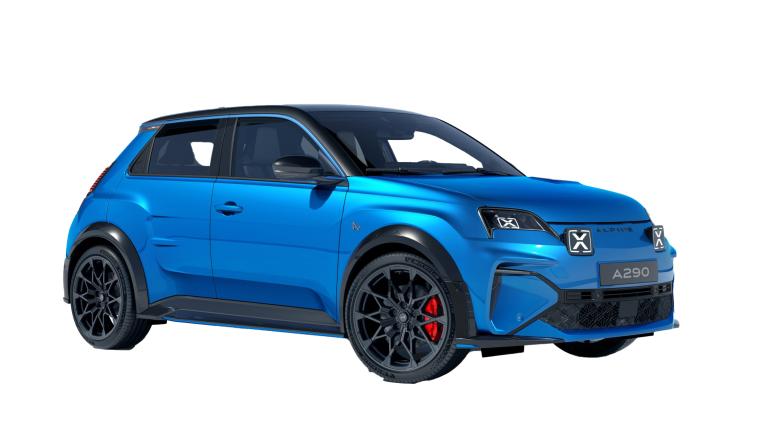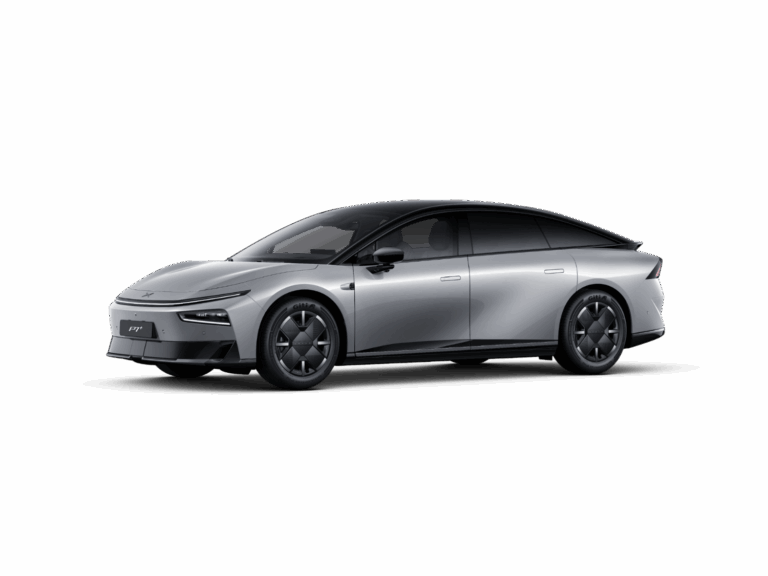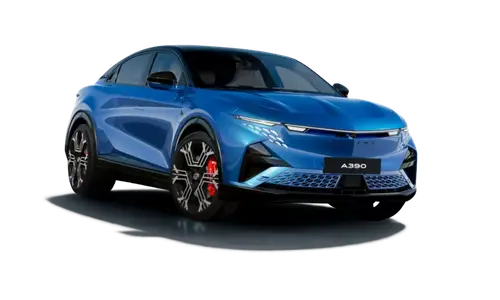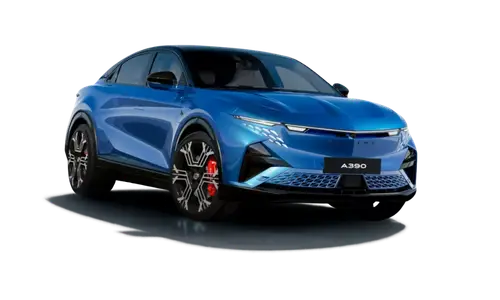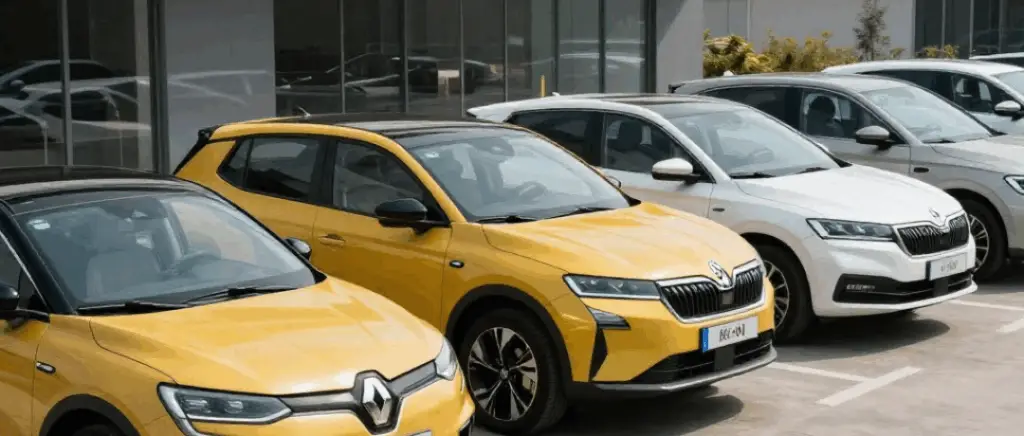Monday to Friday
9am - 12.30pm - 2pm - 7pm
Regulations on CO2 emissions
Since 12 July 2010, when the ENE (National Commitment to the Environment) law came into force, companies with more than 500 employees have been required to carry out a carbon footprint or BEGES (Greenhouse Gas Emissions Balance). This assessment is based on three areas:
- the scope 1 covers all the greenhouse gases emitted directly by the company, such as heating and air conditioning.
- the scope 2 identifies indirect emissions generated by production (manufacturing, machining and handling).
- the scope 3 focuses on indirect emissions linked to the company's activity, such as the purchase of raw materials and the transport of goods. Journeys between home and the workplace fall into this category.. Their inclusion is compulsory from January 2022.
These three scopes provide a precise, targeted assessment of the situation. Based on the results, companies can take appropriate corrective action.
The BEGES must be produced every four years and published on the dedicated Ademe (French Environment and Energy Management Agency) platform. Failure to comply can result in financial penalties of between €10,000 and €20,000 (in the event of a repeat offence).
The car: still the preferred means of transport for the French to get to work
The journey between home and the office is an important lever for companies wishing to reduce their carbon footprint. carbon footprint. Despite the efforts already made to encourage the transition to green mobility, 70% of journeys between home and work are still carried out by car.
This behaviour is not confined to long journeys, since 42% of employees whose workplace is less than a kilometre from their home choose to go there by car!
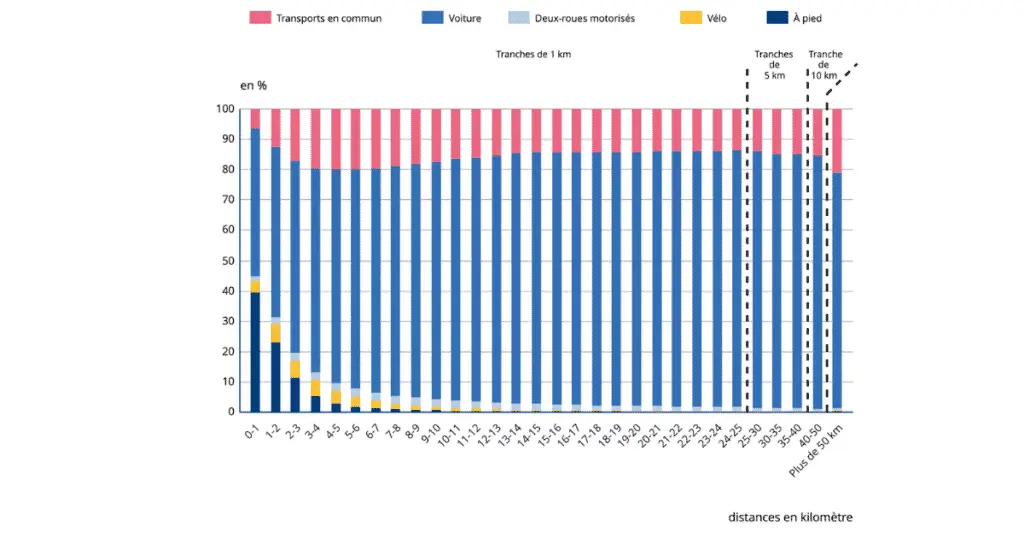
Source : INSEE
When you consider that employees spend an average of 5 hours a week travelling, and that the car is the most popular means of transport for journeys of less than 9 kilometres, it's easy to see why we need to take stock of mobility data.
Because the challenge is not just environmental: it's about rethinking these journeys in favour of soft mobility, geared towards employee comfort and reducing the intrinsic costs of travel.
Until 31 December 2022Discover the range of electric vehicles available for delivery before Christmas!
Data at the heart of the plan to decarbonise journeys to and from work
To diagnose the third scope ofcarbon footprint of a company, it is essential to collect and analyse information on employee travel and the modes of transport used.
The data taken into account to establish a diagnosis of carbon emissions makes it possible to draw up an analysis grid on an individual and then collective scale. They include :
- the distance in km between the employee's home and the company's premises ;
- the mode of transport used, taking into account characteristics such as the vehicle's engine, date of entry into service, type of fuel used and average consumption indices.
By putting routes and data relating to greenhouse gas emissions into perspective according to the vehicle used, you can obtain a precise diagnosis. This can be incorporated into the carbon footprint global of the company and become a working basis for defining short- and medium-term areas for improvement.
The main difficulty lies in choosing a calculation method that is likely to generate rapid results for companies with more than 500 employees, as collecting and processing the data is particularly time-consuming.
How do you calculate the carbon footprint of a journey?
The Bilan Carbone® method published by Ademe in 2004 quantifies greenhouse gas emissions on the basis of objective criteria, such as means of transport and emission factors, in relation to the number of kilometres travelled per day and the number of days worked.
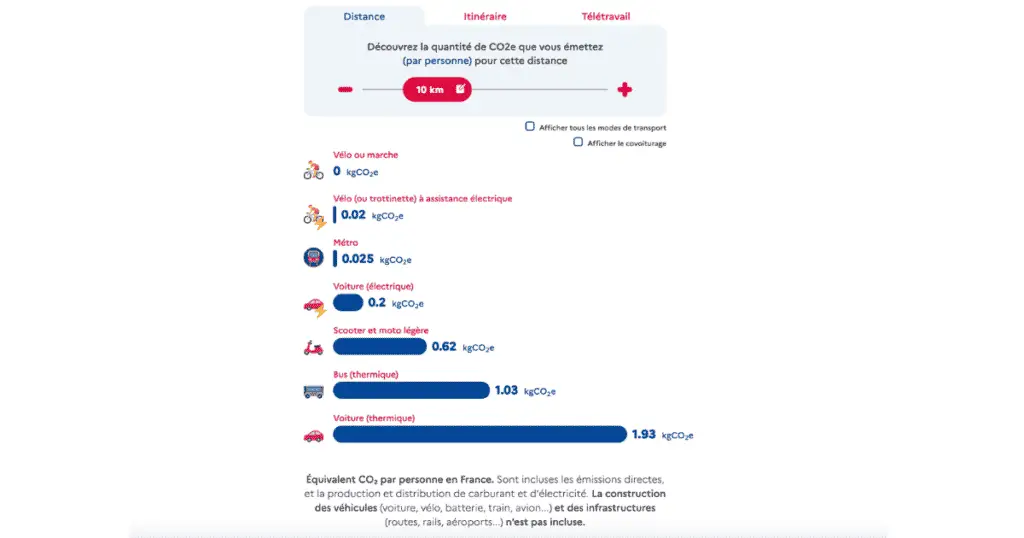
Source : Climate Future
RGPD (General Data Protection Regulation) and route calculation
As we noted above, it is not possible to draw up an exhaustive carbon footprint of home-to-office journeys without having any information about employees' movements. The question is how to collect this information, even though the Labour Code specifies that such journeys do not count as actual working time. In other words, employers have no right to monitor the means used by their employees to get to their company's premises.
This provision has been reinforced by the RGPD (General Data Protection Regulation) in force since 25 May 2018, this European directive on the protection and confidentiality of personal data requires companies to exercise the utmost caution when collecting and using their employees' data.
Geolocation systems are an integral part of the scope of personal information, including when they are installed in company vehicles. While activities carried out during working hours (transporting goods, sales staff movements or deliveries) may give rise to surveillance by the employer (in compliance with the conditions laid down by the CNIL), the same cannot be said of journeys between home and the office, which fall within the scope of private life.
Employees also have a right of access to information collected by navigation and geolocation systems. The RGPD directives stipulate that employees must be informed of the existence of this system and must object to its installation if it does not comply with the regulations.
Measures to increase data security and prevent disclosure must be implemented by the employer.
Lastly, information from geolocation systems must not be kept for longer than a certain period of between two months and five years, depending on the purpose for which it is to be used (e.g. to monitor interventions or working hours).
The impossibility of obtaining information from geolocation to estimate thecarbon footprint of home-work journeys shows just how important it is to involve employees in this approach. Carbon footprint of the company's indirect emissions is closely linked to the declarations of employees, who are inclined to share information about their mobility habits, which involves revealing the time they leave home, the route they take and the technical characteristics of their vehicle.
Solutions to reduce the carbon footprint of home-office journeys
The transition to green mobility cannot be made without the help of your employees. According to a survey carried out by IFOP, 82 % say they are prepared to leave their car in the garage to use another means of transportThe best way to do this is to use a variety of means of transport, such as cycling, public transport or car-sharing.
Nevertheless, the company must be at the centre of this approach and offer a number of support options, such as adjusting employees' working hours to take account of transport needs, financial assistance for mobility, installing charging stations or updating a car-sharing schedule.
Against this backdrop, the sustainable mobility package, which is designed to support travel by employees in both the private and public sectors, is a real opportunity.
Launched in 2018 as part of the LOM Act (Loi d'Orientation des Mobilités), it enables companies with more than 100 employees to roll out a mobility plan with a view to improving the energy transition and optimising their overall CSR policy.
A variety of measures have been implemented, including financing part of the cost of transport with mobility vouchers, subscriptions to bike-sharing services, partial coverage of the cost of fuel for employees who carpool, and the installation of a car park. charging stations for electric cars at the employee's home, etc.
How can you encourage and develop green mobility within your company?
Over and above the immediately perceptible benefits in terms of environmental impact, green mobility has other advantages that can become the core of your sales pitch. Making it easier for your employees to get around can have positive effects on quality of life at work and performance.
Using teleworking to reduce the carbon footprint of home-office journeys
Driven by the constraints associated with the Covid pandemic, teleworking has become widely accepted in France, to the point where it has become a new practice in some organisations.
If kept partially, for a few days a week, it can reduce greenhouse gas emissions. What's more, it is often combined with other strategies to reduce unnecessary travel, such as videoconferencing.
According to ADEME, the benefits of a day's teleworking include make it possible to go from a average of 9 km to 5.5 km travelled.
Soft modes of transport for short journeys
Promoting the use of bicycles (electric or otherwise) for short distances not only helps to reduce traffic congestion, but also helps to limit air pollution. L'kilometre-based compensation for bicycles (IKV), paid as a lump sum by the company, can encourage employees to change their behaviour. It amounts to 25 centimes per kilometre travelled. The IKV can be used to pay off the purchase of a bicycle and finance its maintenance.
Adopt the electric car reflex
Organisations with a fleet of cars have every reason to offer electric company cars to reduce their carbon footprintThis initiative is backed up by other schemes, such as the partial payment of electricity costs by the employer and the provision of a car pool. This initiative is backed up by other measures, such as the partial payment of electricity costs by the employer and the provision of a "car park". charging point personal.
Developing car-sharing
Car-sharing is a means of transport that has developed considerably over the last few decades, driven by platforms that put drivers and users in touch with each other. L'company car-sharing offers similar benefits in terms of reducing GHG emissions and costs. Some tools, such as Klaxitcan help you set up a car-sharing travel plan using intuitive applications and fleet management software.
Commuting to and from work raises important issues for corporate social responsibility, particularly when it comes to short-distance use.
At a time when environmental issues can no longer be ignored, organisations need to take action to promote sustainable mobility by encouraging new ways of behaving that reduce their ecological footprint.
While monitoring journeys is limited by the requirements of the RGPD, there are other alternatives for raising awareness among employees and initiating a successful conversion to greener modes of transport.











